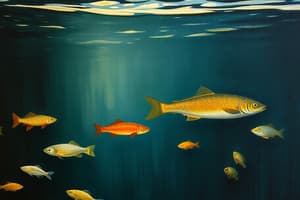Podcast
Questions and Answers
What percentage of the energy stored by producers is passed on to primary consumers?
What percentage of the energy stored by producers is passed on to primary consumers?
- 50 percent
- 10 percent (correct)
- 20 percent
- 5 percent
Which organisms are classified as tertiary consumers in a food chain?
Which organisms are classified as tertiary consumers in a food chain?
- Green plants
- Top carnivores like lions (correct)
- Herbivores like rabbits
- Carnivores like snakes
Which of the following is NOT considered an abiotic component of the environment?
Which of the following is NOT considered an abiotic component of the environment?
- Air
- Soil
- Frogs (correct)
- Humidity
Why do food chains rarely exceed secondary or tertiary consumers?
Why do food chains rarely exceed secondary or tertiary consumers?
What role does water play for living organisms?
What role does water play for living organisms?
What is the primary role of green plants in an ecosystem?
What is the primary role of green plants in an ecosystem?
Which of the following organisms would be classified as a tertiary consumer in a food chain?
Which of the following organisms would be classified as a tertiary consumer in a food chain?
Which statement best describes the concept of a food web?
Which statement best describes the concept of a food web?
What is the role of scavengers in an ecosystem?
What is the role of scavengers in an ecosystem?
In a typical food chain, which organism acts as the primary consumer?
In a typical food chain, which organism acts as the primary consumer?
What is the main function of decomposers in an ecosystem?
What is the main function of decomposers in an ecosystem?
Which of the following is NOT a characteristic of herbivores?
Which of the following is NOT a characteristic of herbivores?
Which scenario describes energy flow in ecosystems effectively?
Which scenario describes energy flow in ecosystems effectively?
What best defines a consumer in ecological terms?
What best defines a consumer in ecological terms?
Which of the following best illustrates a trophic level in a food chain?
Which of the following best illustrates a trophic level in a food chain?
Flashcards
First Trophic Level
First Trophic Level
Plants (producers) that use solar energy to make food.
Trophic Levels
Trophic Levels
Steps representing organisms in a food chain where energy is transferred.
Secondary Consumers
Secondary Consumers
Animals that eat herbivores(primary consumers).
Abiotic Components
Abiotic Components
Signup and view all the flashcards
Energy Transfer (Food Chain)
Energy Transfer (Food Chain)
Signup and view all the flashcards
Consumer
Consumer
Signup and view all the flashcards
Herbivore
Herbivore
Signup and view all the flashcards
Carnivore
Carnivore
Signup and view all the flashcards
Omnivore
Omnivore
Signup and view all the flashcards
Scavenger
Scavenger
Signup and view all the flashcards
Decomposer
Decomposer
Signup and view all the flashcards
Food Chain
Food Chain
Signup and view all the flashcards
Food Web
Food Web
Signup and view all the flashcards
Producer
Producer
Signup and view all the flashcards
Energy Source
Energy Source
Signup and view all the flashcards
Study Notes
Ecosystems
- An ecosystem includes all living and non-living things in an area, and how they affect each other
- The environment surrounding an organism includes all things that affect its life.
- Ecosystem components include producers (plants), consumers (animals), and decomposers (fungi, bacteria).
- Producers create their own food using sunlight, water, and carbon dioxide
- Consumers, like animals, depend on producers or other consumers for food
- Decomposers break down dead organisms and return nutrients to the soil
- Food chains follow the flow of energy from one organism to another during feeding
- Examples of a food chain: green plants → deer → lion
- Food webs display the interconnectedness of multiple food chains within an ecosystem
- Trophic levels are different steps in the flow of energy through an ecosystem (producers → primary consumers → secondary consumers → tertiary consumers)
- Abiotic components include air, water, soil, and climate
- Biotic components encompass all living things in an environment (plants, animals, microorganisms)
- Examples of abiotic components: air, water, soil, climate, temperature, sunlight, and humidity
Biotic Components
- Biotic components are living organisms in an ecosystem
- Examples include plants, animals, microorganisms
- Groups of living organisms based on how they obtain food
- Producers: Make their own food (plants)
- Consumers: Obtain food by eating other organisms (herbivores, carnivores, omnivores)
- Decomposers: Obtain food by breaking down dead organisms (fungi, bacteria)
Abiotic Components
- Non-living components of an ecosystem
- Examples include air, water, soil, sunlight, temperature, and humidity
Food Chains and Food Webs
- A food chain shows the transfer of energy from one organism to another
- A food web shows the interconnectedness of multiple food chains in an ecosystem
- Producers are on the bottom of the food chain
- Primary consumers eat producers
- Secondary consumers eat primary consumers
- Tertiary consumers eat secondary consumers
- Food chains always move from producers to consumers and eventually to decomposers
Types of Ecosystems
- Natural: Terrestrial (forests, grasslands) and Aquatic (ponds, rivers)
- Man-made: Gardens, parks, farms
Importance of Forests
- Forests are a storehouse of biodiversity and biological resources.
- Regulate climate and atmosphere
- Absorb carbon dioxide and release oxygen
- Maintain water cycle and prevent soil erosion
- Provide timber, fuel, fodder, medicines
- Reduce global warming
Studying That Suits You
Use AI to generate personalized quizzes and flashcards to suit your learning preferences.




